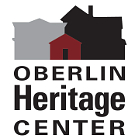Mission, History, and Policies of the Center
Mission
To preserve and share Oberlin’s unique heritage and to make our community a better place to live, learn, work, and visit.
Core Values
The following are values that are shared by the organization and that guide our work and practice.
| Stewardship: | Protect and preserve Oberlin's historical resources and make them accessible to all. |
| Inspiration: | Empower action by engaging individuals in critical and creative thinking, empathy, and discussion. |
| Inclusion: | Seek and embrace a diversity of participation, ideas, and opinions, and recognize everyone's agency as a history keeper. |
| Equity: | Uphold the highest standards of fairness and accessibility to all in practice and service. |
| Integrity: | Be authentic, accurate, and transparent in our management, governance, and interpretive practice. |
| Sustainability: | Prepare for the needs of future generations by being a robust, environmentally-responsible, and forward-thinking community organization. |
Vision Statement
The Oberlin Heritage Center is a forward-thinking, nationally-recognized leader in history and preservation whose programs and services educate and delight, bring diverse individuals together as a community, and inspire all who seek to understand how history shapes our world today and in the future.
History
The Oberlin Heritage Center originated in 1903 as a part of the Progressive-era "improvement" movement when a group of citizens founded the Oberlin Improvement Society (later known as the Oberlin Village Improvement Society), which advocated for improved public hygiene and social and municipal services. In 1958, a separate Oberlin Historical Society organized and began acquiring historic buildings and artifacts. In 1964, the Oberlin Historical Society and the Oberlin Village Improvement Society merged to become the Oberlin Historical and Improvement Organization (O.H.I.O.).
In the early 1990s, O.H.I.O. began its transformation from a small, all-volunteer group to a professional museum and historical organization that gradually began hiring professional staff, systematically collecting and caring for Oberlin-related artifacts and archives, and launching an active program of tours and presentations. In 1998, the organization named its complex of historic buildings the “Oberlin Heritage Center." The OHC complex includes: the 1866 Monroe House (moved in 1960), 1836 Little Red Schoolhouse (moved next to the Monroe House in 1968 and moved to its present site in 1997), and the 1884 Jewett House and its c. 1860s barn (in their original locations, added to the site in 1966).
Today, the Oberlin Heritage Center offers a year-round array of tours, lectures, outreach programs, and research services, as well as acts as a committed community partner and preservation organization. OHC has identified core themes that guide its interpretive work, including education, advocacy, innovation, and community voices. OHC recognizes that there are many histories in the Oberlin community and is eager to preserve and make these stories accessible, as well as provide everyone with the means to preserve what is important to them.
OHC strives for best practices and has proudly maintained accreditation by the American Alliance of Museums since 2005 and is also a designated facility of the National Park Service’s Underground Railroad Network to Freedom program.
Support
The Oberlin Heritage Center is a non-profit organization currently supported by:
- Members and friends like you!
- The Nord Family Foundation
- The Community Foundation of Lorain County
- Ohio Humanities
- Nordson Corporation
- The Green EDGE Fund
- State of Ohio CLG Grant
- Ohio History Service Corps
- Oberlin College Community-Based Work-Study Program
- Leadership Lorain County
- Vantage Aging
Additional Information
Annual Reports since 2004




